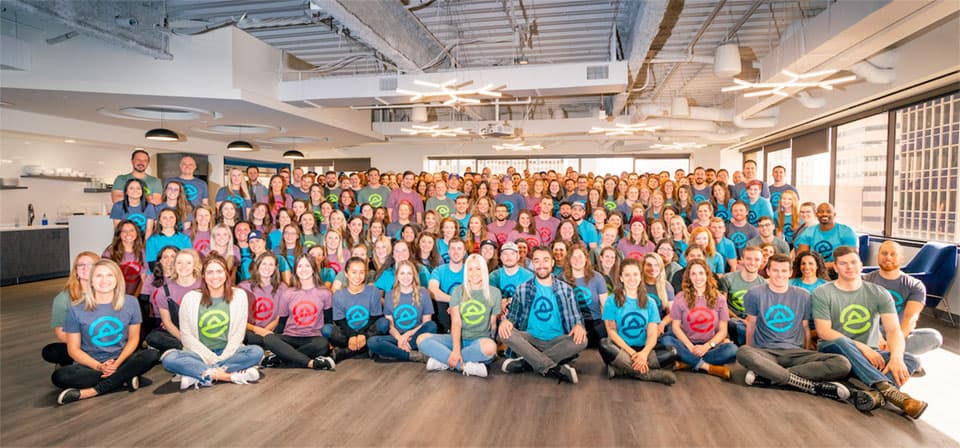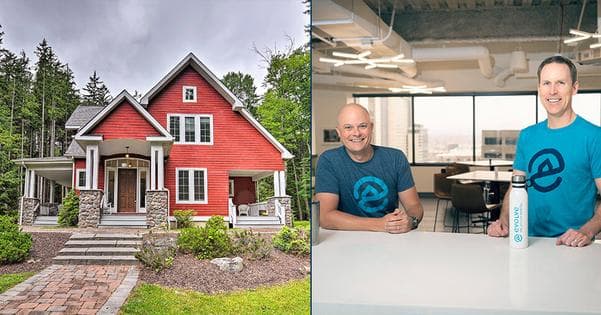In short:
- Brian Egan and Adam Sherry leveraged a career in hospitality to develop Evolve Vacation Rental, a management company for the vacation rental market.
- They developed a technology-forward management platform that helps homeowners list and rent their property for a flat 10% commission.
- During their struggle to build the company, Egan and Sherry saw the surprising benefit of operating a lean company and learned why it’s not always bad to have an idea that others don’t initially value.
In 2011, hospitality veterans Brian Egan and Adam Sherry began brainstorming business ideas related to what they perceived as a booming vacation rental industry.
At that time, folks who listed their homes on sites like Airbnb or VRBO usually handled everything -- from photographing their space to listing it on the site to adjusting the price of a stay when travelers didn’t bite -- on their own. Outsourcing the work was possible but not easy.
"Homeowners had to either hire an overpriced property manager or spend countless hours managing everything," said Egan.
Egan and Sherry thought the experience could be better. So, they created Evolve Vacation Rental.
Today, Evolve works with over 14,000 homeowners and serves over 2 million guests across 700 destinations worldwide. The company has become a significant player in the vacation rental industry, which is projected to produce global revenues of over $87 billion by 2020, all by following a simple mission: to make vacation rental easy for everyone.
Evolve Vacation Rental works with over 14,000 homeowners worldwide. 
But the path to business success was an uphill battle. First, Egan and Sherry had to invent a new kind of vacation management platform. Then, they had to convince venture capitalists that their idea would work. Egan and Sherry's lessons are crucial to entrepreneurs looking to develop evolutionary business models and secure venture capital for outside-the-box ideas.
Egan and Sherry's big idea: bring the vibe of high-end vacation rentals to the mass market
Egan and Sherry met while working at Exclusive Resorts, a members-only vacation club business based in Denver that operates a portfolio of multimillion-dollar homes across the world.
Their former employer was trying to solve a problem for the luxury category. Egan and Sherry saw the growth of mainstream sites like VRBO and Airbnb and realized an opportunity to work on the mass market, enhancing what they perceived as a frustrating user experience for both homeowners and guests.
In 2010, the duo began considering these market challenges with an entrepreneurial mindset.
"We thought [non-luxury vacation rentals] were a great product and service, but the industry was fragmented and inefficient," Egan said. "We believed we were at the forefront of a long arc of mainstreaming."
At first, Egan and Sherry didn't know which product or service they would provide in the category. Still, the opportunity excited them enough to quit their jobs and set up shop in Sherry's basement to figure it out.
Like any good team, Egan and Sherry analyzed the category opportunity during a period of market research (opens in new tab). They looked at insights from a major market research company for the travel industry called Phocuswright (opens in new tab). (Analyst firms like Garner and Forrester (opens in new tab) have a similar function across a handful of industries.) They also listened to quarterly earnings calls from public companies and “spent a lot of time talking to vacation rental owners and guests,” per Egan.
"We pulled apart the industry across three whiteboards and two laptops," he said. "We eventually concluded that what the industry needed was a form of professionalization."
"We eventually concluded that what the industry needed was a form of professionalization."

The two entrepreneurs theorized that as the mainstream vacation rental market matured, consumers would expect better experiences and homeowners would need more tools and services.
They set out to build a vacation rental management service that would bring an air of professionalism to a fragmented vacation rental market. Their service would help home owners do everything from listing their property to finding local cleaning services, taking professional photographs, communicating with guests and adjusting pricing on a seasonal basis.
From idea to output: the challenges of perfecting a product and raising venture capital
Egan and Sherry had a big idea aimed at an emerging market. Now, they just needed the skills and funds to develop the product. They faced a few problems.
"Neither of us was a technologist, and we weren't independently wealthy," Egan said.
To raise capital, Egan and Sherry started with a friends and family round, (opens in new tab) ultimately securing over $500,000 through their personal networks.
To develop a minimum viable product (opens in new tab), they purchased an existing property management software -- rather than building the technology themselves -- then customized it to meet early customer demands and put an Evolve logo on it. (This is similar to using a website builder like Squarespace to get your own website up and running.)
"It was a capital-efficient way to get a product up and going," Egan said.
This strategy allowed Egan and Sherry to get a product live, test assumptions and find out where they were wrong. They started slow, launching with only 14 homes listed for rental on the site, then iterated and learned as they did business with their first few homeowners and their guests. Eventually, it became clear that Evolve needed to raise venture capital (opens in new tab), but the process of securing VC funds proved difficult.
"A lot of [Evolve’s] elements didn't match the pattern of what a VC company typically looks for in a seed round (opens in new tab) [investment]," Egan said.
"A lot of Evolve’s elements didn't match the pattern of what a VC company typically looks for in a seed round investment."
Evolve and its founders bucked some common trends in VC-backed startups (opens in new tab). Research suggests that venture capitalists tend to favor Silicon Valley-based companies, two-time founders and founders with previous exits (opens in new tab) or Ivy League degrees.
Evolve’s founders hadn’t developed the technology it used to operate, which might have seemed strange to VCs used to investing in technology-driven brands, Egan explained. Another problem was that a lot of the VCs that he and Sherry spoke to thought the winners in their category would come from existing marketplace heavyweights such as Airbnb and VRBO.
Egan and Sherry believed that the supply side of the vacation rental market presented the industry’s big, last-mile challenge, but lots of VCs didn't see the problem they were trying to solve.
"I think we were a little early," Egan said.
After 25-plus meetings, a VC named Bob Mylod (opens in new tab) -- a former vice chairman and CFO of Priceline Group (opens in new tab), now Booking Holdings (opens in new tab) -- came to the rescue.
Mylod took interest in Evolve and became a seed investor (opens in new tab), meaning he contributed to the startup’s first batch of VC funding. From thereon out, he spearheaded outreach to more VCs, gauging their interest in contributing to a second round of funding for Evolve. But when none of Mylod’s VC contacts took the bait, he funded the startup’s next stage of development with $2.4 million from his personal VC firm, Annox Capital (opens in new tab).
"That was our big break," said Egan.
Evolve has now raised a total of $103 million in funding, the majority coming from an $80 million raise (opens in new tab) in October 2018 led by T. Rowe Price, an asset management firm.
Evolve has directed the majority of funds toward onboarding new properties -- it now manages nearly 15,000 -- core operations and hiring, Egan said. The team also spent some on building technology; they moved off the original licensed software and onto a self-built platform.
The Evolve Vacation Rental team, which is 500 employees strong and growing, is based in Denver. 
Building an evolutionary product
Evolve has used the investments wisely, developing a product that stands out in the vacation rental management space.
True to its original vision, Evolve's platform has three primary aims:
1. A better vacation rental management model
Evolve takes what Egan refers to as a "holistic approach" to property management.
"We help owners manage the hardest parts of their rental business, like reaching large audiences of guests, listing the property on Evolve’s vacation rental website (opens in new tab) and marketing it through other third-party rental platforms (i.e., HomeAway, VRBO, Airbnb, Tripadvisor, FlipKey), handling photography, setting and adjusting rates, responding to guest inquiries, review management and vetting cleaning companies," said Egan.
"We help owners manage the hardest parts of their rental business."
Instead of charging a 30-50% management fee like most vacation rental management services, Evolve takes a flat fee of 10% of whatever a property owner charges for a stay. The team is able to keep costs low because it operates in multiple destinations whereas most property managers stay extremely local, Egan said. It also exercises “discipline” in spending.
Pro tip: To develop an enticing business model, offer customers the same service or better at a significantly reduced cost.
2. Better support for guests
Evolve also aims to support guests through its "Rest Easy Promise,” which is based on four property standards (opens in new tab): Evolve properties must be safe, guest-ready, clean and as advertised. If a guest finds that a property fails to meet any of these criteria, Evolve guarantees to make it right.
Pro tip: A good business develops its product and structure with its end customers in mind.
Evolve Vacation Rental guarantees that all properties are safe, guest-ready, clean and as advertised.
3. A scalable model
At its start, Evolve was entering a global market. Egan and Sherry needed to develop a technologically-driven business model that could support vacation homes all over the world. To do so, they carefully constructed elements like cleaning: While many similar companies hire their own cleaning staff, Evolve refers homeowners to cleaning companies in the area.
"Traditional property managers are limited by the number of people they can hire in each market for tasks like cleaning and maintenance," said Egan. "Evolve taps into existing businesses in each area and then connects them with our homeowners."
Pro tip: A technology-driven, scalable model is a powerful way to serve a global customer base.
Lessons from Evolve Vacation Rental's business journey
Egan has learned a lot about building and funding a company. Here are two unusual business ideas that other entrepreneurs should consider.
1. If the rest of the world thinks you're wrong, that's often a good thing.
When aspiring entrepreneurs come to Egan for advice or are looking for early-stage investment (opens in new tab), he asks them a question learned from his experiences in fundraising: “What is something that you have pure conviction about that the rest of the world thinks is wrong?”
"If you have a really clear, succinct answer to that question, you probably have an interesting company," Egan said. "But if you don't' have a core belief that the rest of the world disavows, then you're not differentiated."
For Evolve, the idea that supporting homeowners would be crucial to the evolution of the vacation rental market led to an uphill battle with investors who viewed the market differently. It was also one of the keys to the company's ultimate success.
"It's a good thing to be different," Egan said. "But you also have to be right."
"It's a good thing to be different. But you also have to be right."
2. Lack of funding can be a benefit.
According to Egan, a lack of funding early on taught him and Sherry valuable lessons about the right way to run a business.
"It forced us into a mode of being capital efficient and scrappy," he said. "We truly learned to understand the unit economics (opens in new tab) of the company."
Working within a tight budget gives companies the opportunity to understand the difference between investing in company growth and spending, he explained. For example, he was very careful about how he spent his research and development budget, because the budget was so small -- if he’d had access to a windfall of VC money, he might not have been so diligent.
The bottom line
The founders of Evolve built a hugely successful business despite initial resistance to the company's novel approach to vacation rental management. By sticking to their guns, they found partners who saw their vision, raised significant capital and gained a dominant position in the market.
The Evolve Vacation Rental story proves it's not always a bad thing when other people don't understand your business vision. Rather, their confusion might be the first sign that you're onto something big.




